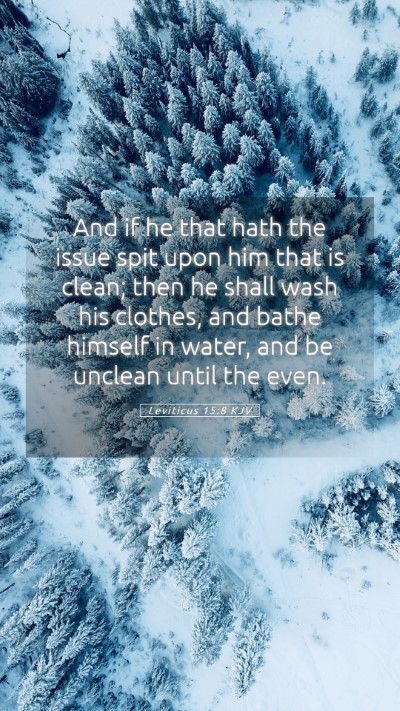Bible Verse Meaning and Commentary for Leviticus 15:8
Verse Reference: Leviticus 15:8 - "And if the woman has an issue of blood for many days that is to her abnormal, or if she has a discharge beyond the time of her impurity, all the days of the issue of uncleanliness shall be as the days of her impurity: she shall be unclean."
Understanding the Context
The Book of Leviticus is primarily concerned with God's laws pertaining to holiness, purity, and sacrificial practices. Leviticus 15 addresses various bodily discharges that render individuals ceremonially unclean. In this specific verse, the focus is on a woman’s prolonged menstrual discharge, highlighting the importance of understanding purity laws within the community of Israel.
Bible Verse Interpretations
- Matthew Henry's Commentary: Henry emphasizes the prevalence of uncleanliness in human life and the necessity of God’s laws to maintain communal purity. He points out the importance of the physical and spiritual realm intertwining in the lives of the Israelites, suggesting that these laws underscore the need for holiness.
- Albert Barnes' Notes: Barnes interprets this verse as a directive for maintaining purity for both social and religious life. He reflects on the societal implications of such laws, helping Israelites recognize how personal issues could impact the collective community before God.
- Adam Clarke’s Commentary: Clarke delves into the cultural and historical context of this law, indicating how these purity restrictions were not merely arbitrary but conveyed deeper truths about human condition and God's standards for cleanliness. He also discusses the implications of a woman's status during her uncleanness and how it reflects wider societal norms.
Insights on Purity and Uncleanliness
This verse serves to illustrate the concept of ritual impurity among the Israelites, showing how bodily functions were linked to spiritual standing. Understanding the implications of being “unclean” during these times points to a larger theme of cleanliness that permeates the religious life of the Jews.
Significance of the Laws
These laws served practical purposes—ensuring social cohesion and health safety—but they also aimed to keep the community mindful of their relationship with God. The distinction between clean and unclean is significant in understanding how to interpret Bible verses, as it leads to insights about holiness, redemption, and the human condition.
Application of Leviticus 15:8 Today
Modern readers might struggle with the applicability of such Old Testament laws. However, they can still draw principles regarding cleanliness, spiritual vigilance, and the importance of community standards. In our lives today, this may translate to the significance of personal integrity, self-awareness, and the impact of our actions on those around us.
Cross References
- Leviticus 12:2 - Concerns about the period of a woman's impurity after childbirth.
- Leviticus 18:19 - Addresses the consequences of sexual relations during a woman’s menstrual period.
- Mark 5:25-29 - An account of a woman who suffered from a hemorrhage and her faith in Jesus for healing, which relates to the issues of purity and healing from uncleanness.
Conclusion
Bible verse meanings, especially in complex passages like Leviticus 15:8, emphasize both cultural context and eternal principles regarding holiness and community. Engaging with public domain commentaries enriches our understanding of Scripture and enables deeper reflections on how these principles apply to our lives today.
By studying this verse, we are reminded of the continuous need for purity in our hearts and interactions, ensuring that we remain in good spiritual standing before God and our communities.


